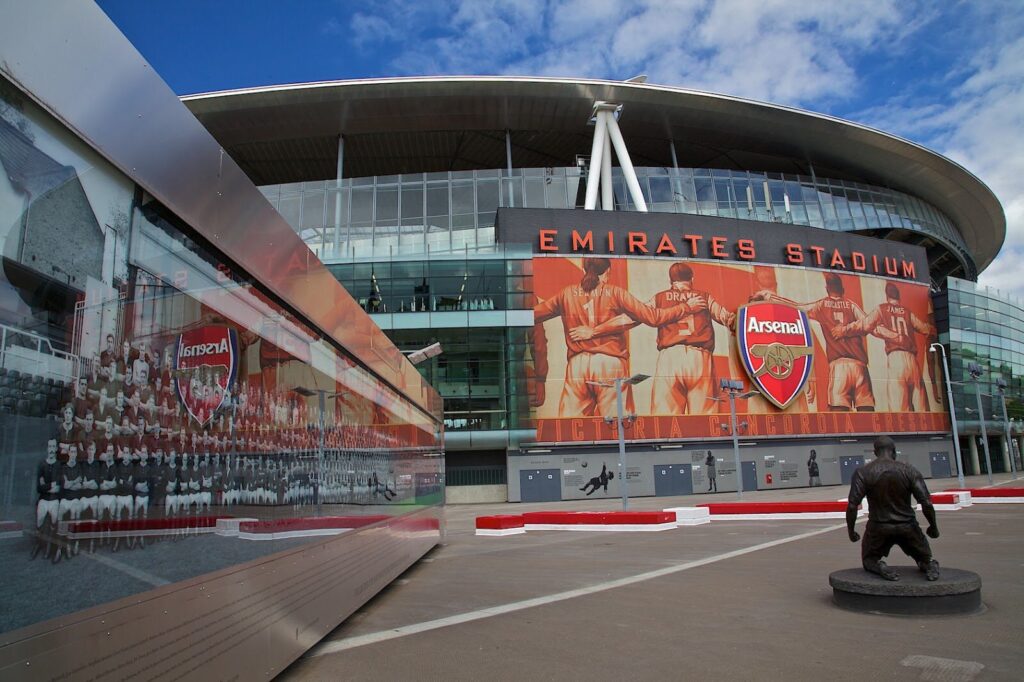- Confirmed line-ups: Brentford vs Arsenal – Saliba ruled out, Trossard starts
- Arsenal Tracking Valencia Starlet Hugo Fernandez
- Arsenal showing ‘concrete interest’ in Christian Pulisic
- Expected Arsenal line-up against Brentford
- Arsenal and Chelsea target Club Brugge’s Stankovic
- Arsenal linked with AC Milan’s Christian Pulisic move
- Arsenal eye move to sign Bayern Munich’s Leon Goretzka
- Arsenal in regular talks to sign Atletico’s Julian Alvarez
- Arsenal eye move to sign Everton star Iliman Ndiaye
- Arsenal step up efforts to sign FC Nordsjaelland’s Yirenkyi
Split-Second Decisions at the Emirates
Every Arsenal match at the Emirates Stadium comes down to a handful of instant decisions.
Players make snap choices in tight spaces. Coaches issue tactical instructions that can flip the momentum in seconds. These moments aren’t just dramatic—they decide matches, league positions, and even careers.
From last-ditch tackles to substitutions that turn games on their head, split-second thinking defines the highs and lows for everyone involved. In this article, we’ll explore how these crucial decisions unfold and why they make football at the Emirates so compelling for fans and players alike.
The high stakes of instant choices: pressure, precision, and performance
Premier League matches at the Emirates never allow for a pause button. One moment you’re watching a controlled midfield build-up, and the next, chaos unfolds—a misplaced pass, a quick counter, or a sudden defensive gamble. The margin between glory and disappointment often shrinks to a single heartbeat.
Arsenal’s players are expected to make choices in fractions of a second. When Gabriel Jesus receives the ball under pressure, he needs to decide whether to dribble, pass, or shoot—without losing his composure or sight of the bigger picture. These moments demand more than just skill; they require supreme confidence and mental clarity.
The coaching staff face their own tests in the technical area. Should Arteta change formation with twenty minutes left? Does he trust youth off the bench when nerves are already frayed? The wrong decision can tilt an entire season off course—something Arsenal fans know all too well.
What I find fascinating is how much training goes into preparing for these split-second calls. Drills simulate real-match pressure so that instinct becomes second nature. Yet nothing fully recreates the weight of a packed Emirates on matchday.
If you want insight on making calculated decisions yourself, Smart Betting Guide breaks down strategies for keeping your head clear when it matters most.
On the pitch: player instincts and match-defining moments
Some of the most unforgettable Arsenal moments at the Emirates happen in a heartbeat—one bold tackle, a deft interception, or a striker’s lightning-quick run can flip the script.
What drives these split-second reactions? Instinct, yes—but also years of training, mental sharpness, and a keen sense for reading play as it unfolds.
The margin between hero and heartache is razor-thin. When instinct leads to glory, it electrifies both the squad and the stands. Yet when that instinct misfires, it can cost dearly.
Reading the game: anticipation and awareness
The best players aren’t just physically gifted—they possess an almost intuitive sense for what happens next.
This anticipation comes from relentless analysis, film study, and hours spent on the training ground tracking patterns. Over time, players start to “see” passing lanes before they appear or spot a striker’s run two moves ahead.
I’ve watched defenders at the Emirates cut out dangerous balls not by reacting late but by already being in position—almost like chess grandmasters predicting an opponent’s strategy several turns ahead.
This kind of awareness separates good from great. In high-pressure games, it means being first to loose balls or finding space for that one chance that changes everything.
The science of reflexes: training for speed
No amount of tactical know-how matters if you can’t act quickly enough when opportunity knocks. That’s why top clubs like Arsenal invest so much in sharpening reflexes—both mental and physical.
Training drills often focus on rapid decision-making under pressure: tight-space rondos, high-speed reaction lights, or scenario-based scrimmages where players must respond instantly to new cues.
A 2023 study published in PLOS ONE (Reaction Time in Soccer) highlights that physical fitness is a strong predictor of reaction time in soccer players. Faster reactions, developed through targeted training, can be crucial for quick decision-making and effective performance on the pitch.
At this level, a half-second delay can mean conceding a goal or missing a golden chance—so honing these skills is non-negotiable.
When instinct backfires: risks and red cards
No discussion of instant decisions would be complete without mentioning their downside. A moment’s rush of blood—a reckless challenge or misjudged lunge—and suddenly you’re staring at a yellow or red card.
We’ve seen matches at the Emirates swing dramatically after one impulsive tackle leads to dismissal or gives away a crucial penalty. The emotional charge of live football makes it easy to get caught up in adrenaline-fueled moments that override discipline.
Players talk about learning from these errors—recognizing when to pull back rather than dive in. In my view, managing risk is as important as seizing opportunity. The best find ways to channel their instincts without letting them cross the line into disaster territory.
Tactical brilliance under pressure: how managers make instant calls
Managers at the Emirates face a relentless test of nerve and expertise during every match. Their ability to make split-second tactical decisions—whether to change shape, shift formation, or introduce fresh legs—can swing the outcome in Arsenal’s favor or leave fans questioning what might have been.
The pressure isn’t just from thousands of supporters watching in real time. It comes from knowing that one misjudged substitution or delayed instruction can unravel hours of preparation. The best managers combine instinct with experience, reading not just the opposition but also their own players’ body language and fatigue levels.
In my view, what sets elite coaches apart is their willingness to trust both data and gut feel when everything is on the line. These moments often define a season—and build a legacy.
Substitutions and game-changers
The right substitution at the right moment is more than a tactical tweak—it’s a gamble that can transform a game. Arsenal’s history at the Emirates is packed with examples where an unexpected introduction shifted momentum completely.
Think back to last season, when Mikel Arteta brought on Leandro Trossard midway through a tense home match against Manchester United. Within minutes, Trossard found space in the box and set up the winning goal—a decision hailed by pundits and supporters alike.
What impresses me is how top managers weigh up countless factors: player fitness, opponent weaknesses, the psychological impact on both teams. There are moments when taking off an experienced defender for an attacking threat sends exactly the right message—not just tactically but emotionally too.
Sometimes it doesn’t work out and critics are quick to pounce, but those high-stakes calls are part of what makes football so compelling at this level.
In the dugout: communication and leadership under pressure
The dugout on matchday is organized chaos. Managers must keep one eye on unfolding play while rapidly relaying instructions—often through hand signals or short bursts to assistants wearing earpieces.
I’ve watched coaching teams coordinate set-piece changes in seconds or reassign marking duties after spotting subtle shifts in opposition shape. Verbal clarity matters, especially in front of 60,000 roaring fans where miscommunication can be costly.
The emotional tone set by leaders like Arteta makes a real difference too. You’ll see him encouraging individuals after mistakes or rallying the group with animated gestures during lulls in play. That visible belief ripples through the team; confidence from the touchline has won Arsenal crucial points more than once.
Leadership here isn’t about elaborate speeches—it’s about making sure instructions cut through noise so everyone knows exactly what’s required in those pivotal moments.
Technology and data: the new edge in decision-making
The days when managers relied solely on intuition are long gone at top clubs like Arsenal. Today’s staff have live data feeds streaming into their dugouts—from player running stats to heat maps showing positional trends as they unfold.
This technology arms coaches with instant feedback for making bolder choices mid-game: Should they push for another goal? Are key players fatiguing faster than expected? Subtle tweaks now come backed by real numbers rather than gut alone.
A 2023 thesis from Loughborough University shows just how central analytics have become at this level. Real-time performance data allows managers to adjust strategies instantly and optimize results under pressure—a trend that’s only accelerating each season.
The challenge now is blending technology with human insight; those who do it well give their sides a genuine edge when every second counts at the Emirates.
The fan experience: split-second reactions beyond the pitch
Every matchday at the Emirates pulses with more than just what happens on the grass. Supporters are wired into every second, their emotions shifting instantly as the drama unfolds.
These split-second responses from the stands don’t just reflect the action—they help shape it, turning routine moments into shared memories and influencing the energy in the stadium.
From roar to groan: emotional highs and lows
When a goal goes in or a last-ditch tackle is made, you feel it—sometimes before you even see it. The roar that erupts after a well-timed pass or shot can fuel players to push harder, while collective groans after a missed chance send waves of frustration across the pitch.
I’ve seen momentum swing in an instant at Arsenal home games. A crowd’s rising voice adds urgency and confidence for the team, and sometimes unsettles visiting sides. It’s these visceral, unfiltered reactions that make live football in North London such an electrifying experience.
Social media and the age of instant opinion
The split-second decisions aren’t limited to those inside Emirates walls. As soon as something big happens, thousands of fans fire off reactions on Twitter or WhatsApp—sometimes before TV replays even finish.
Sports Fandom on Social Media highlights how platforms like X (formerly Twitter) let Arsenal supporters share their joy—or vent their frustrations—immediately. According to a 2024 study in the ‘International Journal of Sport Communication,’ this instant communication helps build global communities that shape how matches are remembered long after full time.
The rituals of reaction: matchday traditions
Some moments go beyond cheers or sighs—they become tradition. Think of “North London Forever” echoing before kickoff, or spontaneous chants breaking out when Arsenal pile on pressure late in a tight match.
I’ve watched complete strangers celebrate goals together, high-fiving over spilled pints or embracing after dramatic wins against Spurs. These rituals—the singing, scarf-waving, halftime debates—give every Emirates game its own personality and keep fans coming back season after season.
Conclusion
Split-second decisions are the heartbeat of every Arsenal match at the Emirates. Whether it’s a player trusting their instinct, a manager making a bold tactical call, or fans reacting in unison, these moments define the experience for everyone involved.
Understanding what goes into these lightning-fast choices—on the pitch, in the dugout, and in the stands—helps us see football’s drama in a new light. It’s these unpredictable twists that make each match unforgettable and keep supporters returning season after season.





